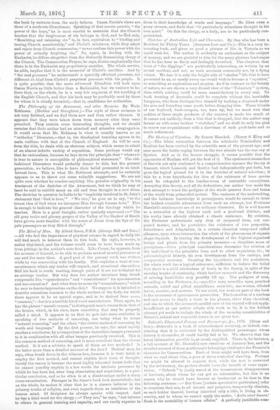The Mind of Man. By Alfred Smoe, F.R.S. (George Bell
and Sons.) —All who feel the importance of physical science in regard to daily life will find much to interest them in this book. Its style, however, is rather disjointed, and the volume would seem to have been made up from jottings in the author's note-book. Like Caesar, he appears, from his account of himself, to be able to perform several mental processes at one and the same time. A good part of the present work was written while he was conversing with his family. This explains a want of con- secutiveness which any reader will remark, and occasional obscurities. Still his book is worth reading, thongh parts of it are too technical for an average reader. But why does the author introduce long Greek compounds like "opsaisthenics " and " ousaisthenics" for eye-sensation and ear-sensation? And what does he moan by" coenaisthenics," which he uses to denote impressions on the skin? We suppose it is intended to describe sensations common to the whole surface of the body, for which there appears to be no special organ, and to bo derived from a04/0r, "common,"—but it is a terrible bit of word-manufacture. Then, again, he has the phrase" noemic reason," to distinguish man's reason from that of the brutes, which, in his view, have something that may be properly called a mind. It appears to us that he gets into some confusion in speaking of two methods of reasoning, one being what he terms "natural reasoning," and the other, "the slower method of reasoning by words and language." By the first process, he says, the mind rapidly reaches a conclusion, by a comparison of the immediate images presented to it in combination with all other images previously received. This is the common method of reasoning, and is more excellent than the slower method. Is it not a mistake to speak of them as two methods? Is the latter more than a detailed account of the first ? Medical men, he says, often break down in the witness-box, because it is their habit to employ the first method, and cannot explain their train of thought. Surely the reason is because the most highly educated doctor feels that he cannot possibly explain in a few words the intricate processes by which he has been led, after long observation and experience, to a par- ticular conclusion, and so he often is at a disadvantage under a sharp cross-examination. Passages in Dr. Smee's book look materialistic, but on the whole, he makes it clear that be is a sincere believer in the primary truths of religion, and even regards them as intuitions of the human mind. Of Scripture he always speaks with respect. And helas a kind word for the clergy :—" They are," he says, "not inferior to others in general training and capacity, and are vastly superior to them in their knowledge of words and language." He likes oven a prosy sermon, and finds that "it particularly stimulates thought in his own mind." On this the clergy, as a bady, are to be particularly con- gratulated.


































 Previous page
Previous page